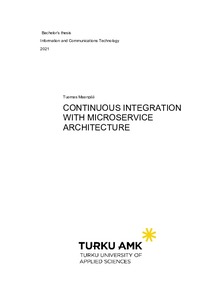Navigating software architecture : evaluating monolithic architectures in modern development
Shrestha, Deepsikha (2024)
Shrestha, Deepsikha
2024
All rights reserved. This publication is copyrighted. You may download, display and print it for Your own personal use. Commercial use is prohibited.
Julkaisun pysyvä osoite on
https://urn.fi/URN:NBN:fi:amk-2024052515671
https://urn.fi/URN:NBN:fi:amk-2024052515671
Tiivistelmä
The attainment and scalability of a project are substantially influenced by the architectural framework selected within the dynamic realm of software development. Monolithic architectures represent one among several architectural paradigms that have endured over time, constituting a traditional approach to software system development. However, the usefulness and significance of monolithic designs are being reassessed in light of the emergence of microservices and other contemporary architectural styles.
Within the framework of contemporary software development, this thesis offers a thorough examination of monolithic architectures. This thesis conducts a thorough analysis to look at the benefits, drawbacks, and trade-offs of monolithic architectures, taking into account factors such as deployment complexity, maintenance overhead, scalability, and development speed. In order to give the insight into when monolithic architectures might still be a good option and when alternatives might be more beneficial, the examinations of real-world case studies and industry best practices are to be done in the thesis.
In addition, this thesis approaches to modernize and evolve current monolithic systems, such as refactoring, containerization, and modularization. This thesis work is to provide software architects and developers with the information and resources it required to make wise decisions while designing and developing software systems in the fast-paced world of today. It does this by emphasizing the potential and problems that come with monolithic designs.
Within the framework of contemporary software development, this thesis offers a thorough examination of monolithic architectures. This thesis conducts a thorough analysis to look at the benefits, drawbacks, and trade-offs of monolithic architectures, taking into account factors such as deployment complexity, maintenance overhead, scalability, and development speed. In order to give the insight into when monolithic architectures might still be a good option and when alternatives might be more beneficial, the examinations of real-world case studies and industry best practices are to be done in the thesis.
In addition, this thesis approaches to modernize and evolve current monolithic systems, such as refactoring, containerization, and modularization. This thesis work is to provide software architects and developers with the information and resources it required to make wise decisions while designing and developing software systems in the fast-paced world of today. It does this by emphasizing the potential and problems that come with monolithic designs.
Kokoelmat
Samankaltainen aineisto
Näytetään aineisto, joilla on samankaltaisia nimekkeitä, tekijöitä tai asiasanoja.
-
Implementation of sustainable architecture patterns in hot and dry regions of Iran by investigating on vernacular sustainable architecture patterns
Gharahshir, Mohammadreza (2019)Today, sustainable development and the saving of non-renewable energies have become one of the most important and common issues internationally. Considering the significant consumption of fossil fuels in the contemporary ... -
Enhancing architectural processes through service design : integrating service design methods into architectural workflows: toward user-friendly built environments
Ahmed, Sabbir (2025)The thesis examines the potential of service design practices to help architects create more user-centered, sustainable and adoptable built environments. Conventional architectural design tends to focus more on the technical ... -
Continuous Integration with Microservice Architecture
Maanpää, Tuomas (2021)Testing an application should be obvious part of an application development for developers but it might be left out of the application for one reason or another. This may lead to regression and dissatisfaction between ...



